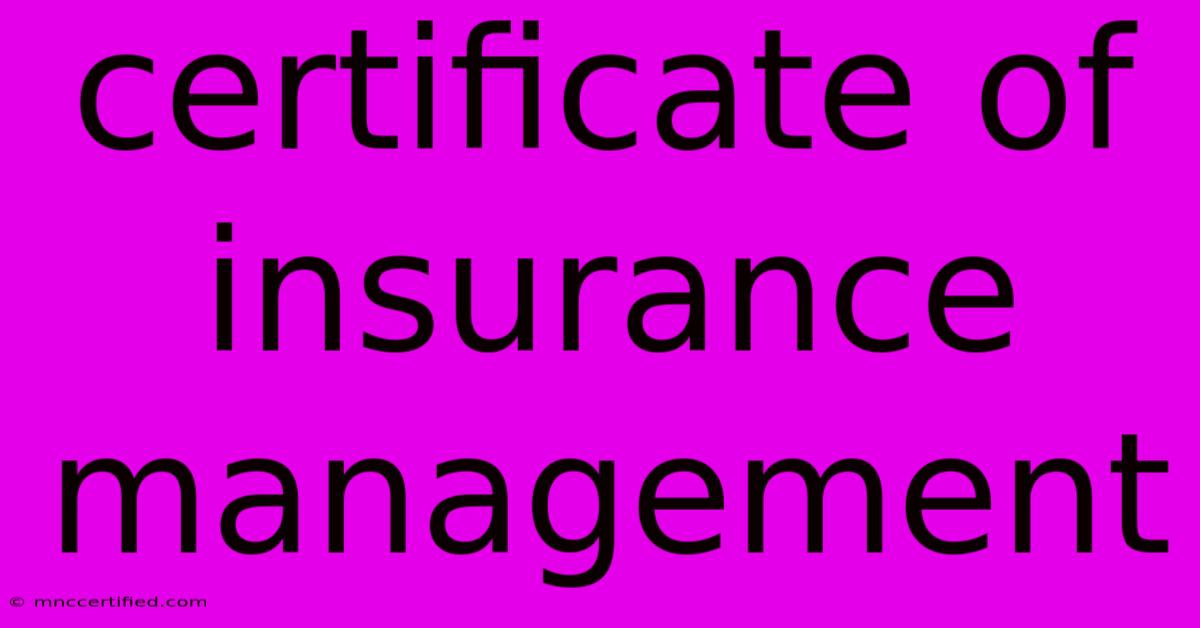Certificate Of Insurance Management

Table of Contents
Mastering the Art of Certificate of Insurance Management: A Comprehensive Guide
In the dynamic world of business, ensuring adequate insurance coverage is crucial for mitigating risks and protecting your organization. Certificates of insurance (COIs) play a vital role in this process, serving as a vital document that verifies the existence and scope of insurance policies. Effective certificate of insurance management is not just about collecting and filing paperwork; it’s about streamlining operations, minimizing risk, and maximizing efficiency.
Understanding Certificates of Insurance: The Basics
A Certificate of Insurance is a formal document issued by an insurance company that outlines the coverage details of a specific policy. It typically includes information such as:
- Policyholder: The name of the insured party
- Policy number: Unique identifier for the insurance policy
- Coverage details: Types of coverage, limits, and deductibles
- Effective dates: Policy start and end dates
- Insurer: Name and contact information of the insurance company
Why is Certificate of Insurance Management Crucial?
1. Risk Mitigation: By verifying the existence and adequacy of insurance coverage, COIs help mitigate potential financial and legal risks. They ensure that parties involved in business transactions have the necessary protection.
2. Contractual Compliance: Many contracts require parties to provide COIs as a condition of agreement. Failing to provide valid COIs can lead to contractual breaches and financial penalties.
3. Operational Efficiency: Proper COI management simplifies the process of requesting, reviewing, and storing these important documents. It helps avoid delays and unnecessary paperwork.
4. Legal Protection: In the event of an incident or claim, COIs provide proof of insurance coverage and can help protect your business from legal liabilities.
Key Steps for Effective Certificate of Insurance Management:
1. Establish Clear Policies and Procedures: Document your company’s requirements for receiving, reviewing, and storing COIs. This should include:
- Types of insurance required: Determine the specific insurance types your business needs, such as general liability, workers' compensation, or auto insurance.
- Minimum coverage levels: Establish acceptable coverage limits for different types of insurance.
- Renewal deadlines: Set reminders for when COIs need to be updated or renewed.
- Digital vs. Paper: Decide whether you'll manage COIs digitally or through paper files.
2. Implement a Streamlined Request Process: Make it easy for your company and clients to request COIs. This can be done through:
- Online platforms: Consider using software solutions specifically designed for COI management, which can automate the request and review process.
- Automated email templates: Create standardized email templates for requesting COIs to ensure consistent communication.
- Centralized repository: Establish a dedicated location for storing all COIs.
3. Regularly Review and Update COIs: Ensure that all COIs are current and accurate. This includes:
- Automated notifications: Set up alerts for expiring policies and upcoming renewal deadlines.
- Policy changes: Monitor for changes in coverage or policy terms and update COIs accordingly.
- Auditing: Regularly audit your COI database to identify any missing or outdated documents.
4. Leverage Technology for Efficiency: Utilize software solutions to streamline your COI management process. These tools can help with:
- Centralized storage: Store all COIs in a secure, cloud-based platform.
- Automated reminders: Receive alerts about expiring policies and upcoming renewal deadlines.
- Automated workflows: Streamline the process of requesting, reviewing, and approving COIs.
5. Train Staff on COI Procedures: Ensure all relevant personnel understand your company's COI policies and procedures. This will help maintain consistency and ensure accurate handling of these important documents.
Benefits of a Well-Managed Certificate of Insurance Process:
- Reduced risk: Minimize potential financial and legal liabilities by ensuring proper insurance coverage.
- Enhanced efficiency: Streamline operations and eliminate delays associated with COI management.
- Improved compliance: Meet contractual obligations and avoid penalties for non-compliance.
- Stronger business relationships: Demonstrate professionalism and reliability by effectively managing your COI process.
Conclusion:
Effective certificate of insurance management is an essential aspect of any business' risk mitigation strategy. By implementing the steps outlined above, you can streamline your processes, protect your organization, and ensure compliance with all relevant requirements. Investing in technology and establishing clear policies will contribute to a smooth and efficient COI management system, ultimately enhancing your business' overall success.

Thank you for visiting our website wich cover about Certificate Of Insurance Management. We hope the information provided has been useful to you. Feel free to contact us if you have any questions or need further assistance. See you next time and dont miss to bookmark.
Featured Posts
-
Spoelstras Blunder Dims Herros 40 Point Performance
Nov 13, 2024
-
Does Insurance Cover Ptosis Surgery
Nov 13, 2024
-
Song Jae Rims Instagram Whats New
Nov 13, 2024
-
Megalopolis Streaming Is Deadpool And Wolverine A Marvel Movie
Nov 13, 2024
-
Who Pays For Lender Title Insurance
Nov 13, 2024